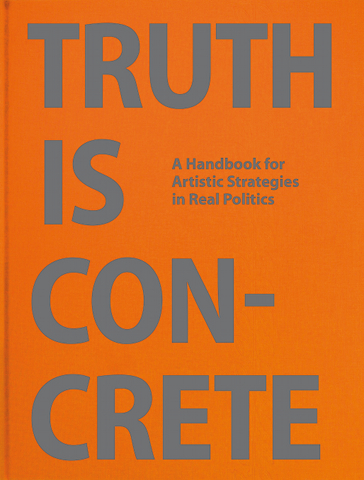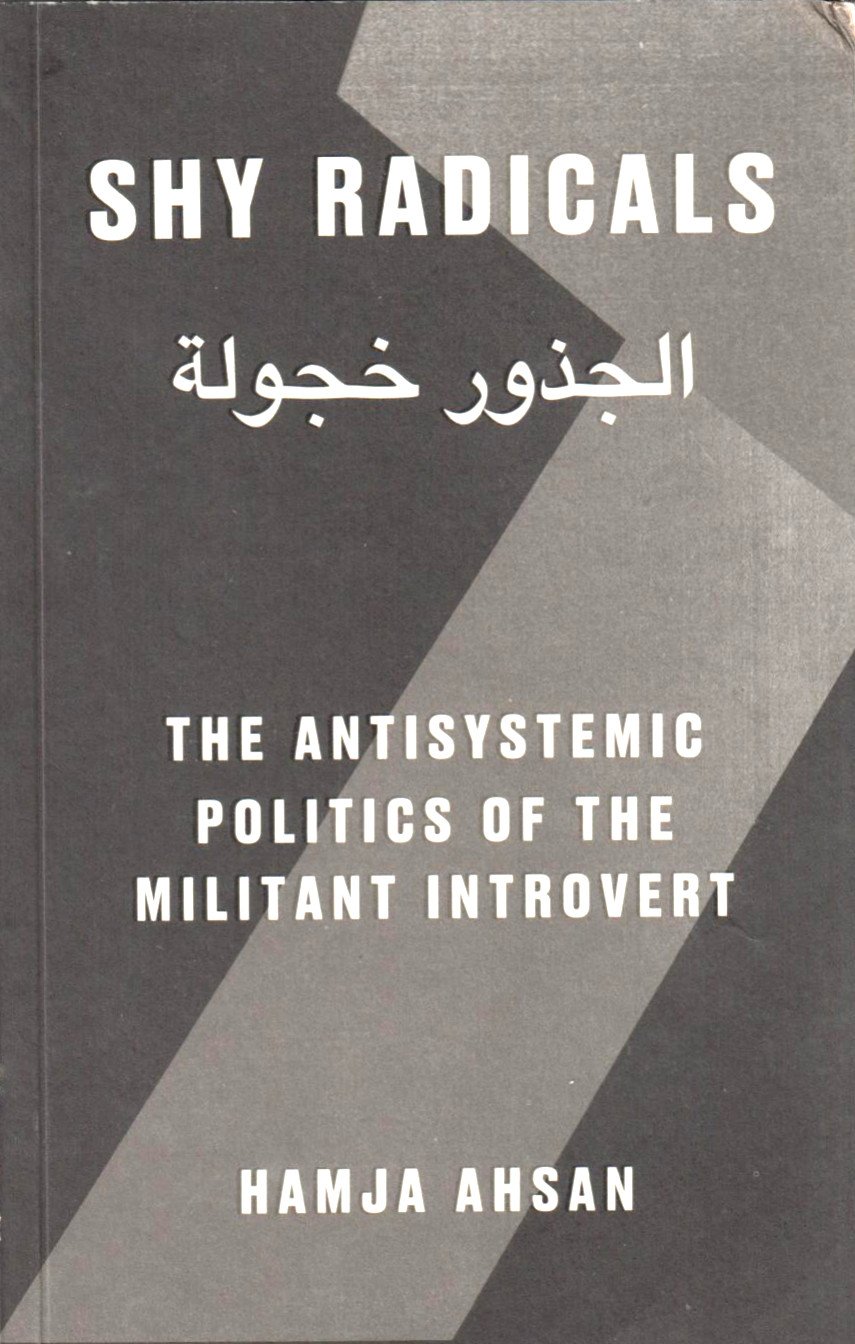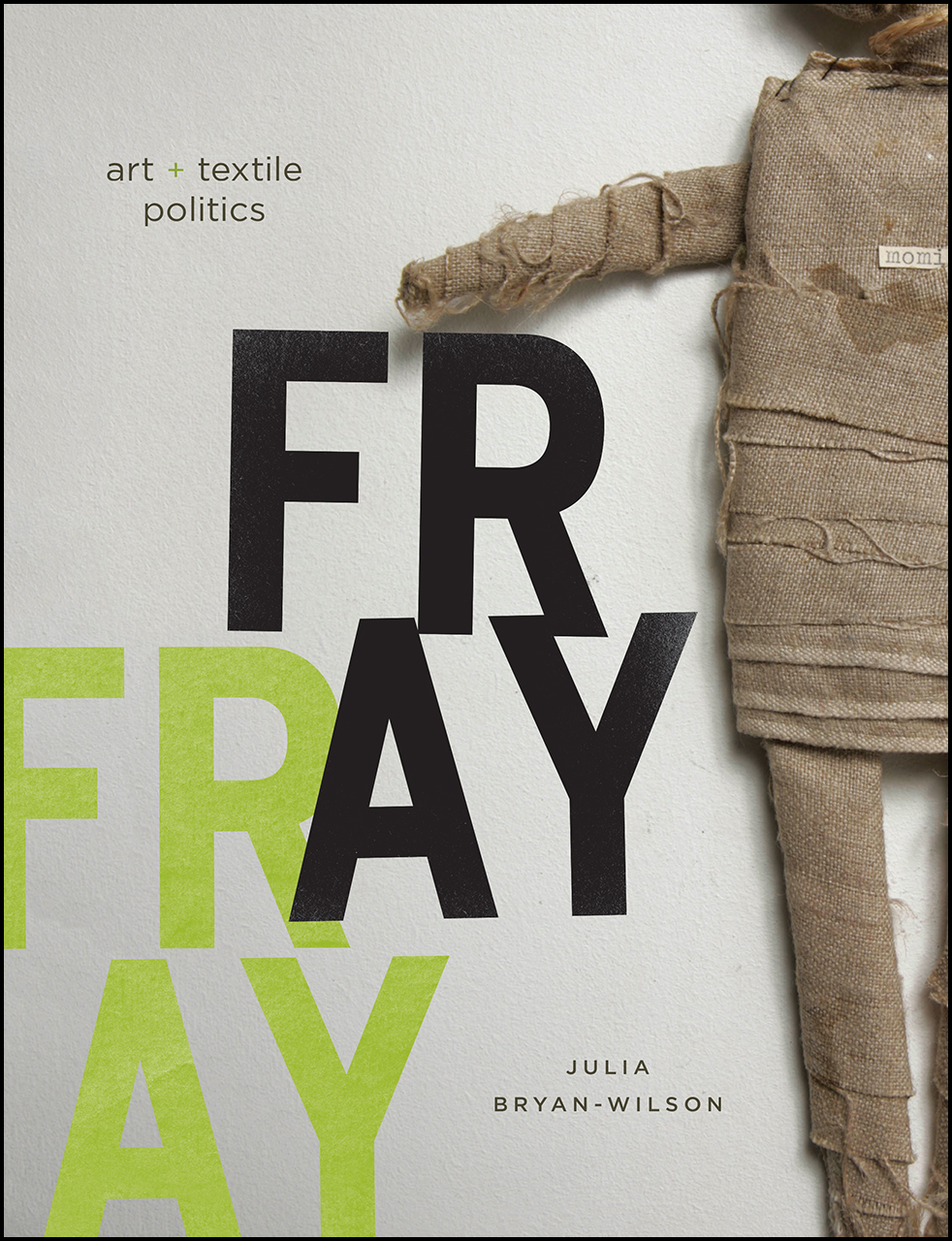Truth Is Concrete: A Handbook for Artistic Strategies in Real Politics (2014)
Filed under book | Tags: · activism, art, participation, participatory art, political art, politics, protest, social movements, tactics, useful art

“How does art play a role in social and political struggles all over the world? Can art be a tool with which to shape the world, rather than just reflect it?
Truth Is Concrete: A Handbook for Artistic Strategies in Real Politics takes the possibility of concrete truth as a working hypothesis and looks for direct action and concrete knowledge: for an art that not only represents and documents, but engages in specific political and social situations—and for an activism that not only acts for the sake of acting but searches for intelligent, creative means of self-empowerment. This book is the second manifestation under this title; the first materialized as a twenty-four-hour, seven-day marathon camp that took place in the frame of the steirischer herbst festival in Graz, Austria, in September 2012.
This handbook is a stand-alone publication, emphasizing the “usefulness” of the different artistic approaches collected. It is a toolbox and a manual with contributions by key protagonists in this field. One hundred texts describe very different strategies and tactics, written by their inventors and/or practitioners from all over the world, mapping the broad field of engaged art and artistic activism today. Additional essays focus on the philosophy, structures, and modalities behind the many battles to make this world a better place.”
Essays by Stephen Duncombe and Steve Lambert, Alanna Lockward, Florian Malzacher, Chantal Mouffe, Gerald Raunig, Jonas Staal; a conversation with etcetera, Nato Thompson, WHW; and drawings by Dan Perjovschi.
With further contributions by Jonathan Allen, Udi Aloni, Corina L. Apostol / Artleaks, Hector Aristizábal, Saki Bailey / Teatro Valle, Artúr van Balen / Tools for Action, Katherine Ball, Andy Bichlbaum / The Yes Men, Reverend Billy & The Church of Stop Shopping, Leah Borromeo, Andrew Boyd, Tania Bruguera, Santiago Cirugeda / Recetas Urbanas, Collective Authorship, Corrupt Tour, Gabriella Csoszó / FreeDoc, Minerva Cuevas, Neil Cummings, Diedrich Diederichsen, Charles Esche, Noah Fischer, Benjamin Foerster-Baldenius / raumlaborberlin, Sérgio Miguel Franco / Pixadores, Andrea Fraser, Isabelle Fremeaux, Christine Gaigg, Ganzeer, Federico Geller, Guillermo Gómez-Peña / La Pocha Nostra, Marina Gržinić, Núria Güell, Erdem Gündüz, Hans Haacke, The Haircut Before The Party, Stefano Harney, Carl Hegemann, Justin Hoffmann, Khaled Hourani, Iconoclasistas, The Institute for Human Activities, International Institute of Political Murder, Janez Janša, Khaled Jarrar, Jeudi Noir, Anna Jermolaeva, John Jordan, Janice Kerbel, Jisun Kim, Omer Krieger, the laboratory of insurrectionary imagination, Kalle Lasn / Adbusters, André Lepecki, Lexxus Légal, Lawrence Liang, Liberate Tate, Geert Lovink, Matteo Lucchetti, Lucifer / Church of Kopimism, Oliver Marchart, Leónidas Martín, Joana Mazza / Observatório de Favelas, Tomislav Medak, Thomas Meinecke, Jasmina Metwaly / Mosireen Collective, Antanas Mockus, Jean-Luc Moulène, Rabih Mroué, Michal Murin, Marina Naprushkina / Office for Anti-Propaganda, Neue Slowenische Kunst, Occuprint, Robyn Orlin, Ahmet Öğüt / The Silent University, Sibylle Peters, The Pinky Show, Srđa Popović / CANVAS, Public Movement, Raivo Puusemp, Richard Reynolds, Irit Rogoff, Ned Rossiter, Philipp Ruch / Center for Political Beauty, Yekaterina Samutsevich / Pussy Riot, Florian Schneider, Frank Apunkt Schneider / monochrom, Susan Schuppli / Forensic Architecture, Shared Inc., Inna Shevchenko / Femen, Gregory Sholette, Stevphen Shukaitis, Toma Sik, Kostis Stafylakis / Kavecs, Mladen Stilinović, Kuba Szreder, Claire Tancons, Mierle Laderman Ukeles, Ultra-red, the vacuum cleaner, Dmitry Vilensky / Chto Delat?, Marina Vishmidt, Joanna Warsza, WochenKlausur, Krzysztof Wodiczko, Jacob Wren, Stephen Wright, Kàddu Yaraax, Wu Yuren, Salam Yousry, and Slavoj Žižek.
Edited by steirischer herbst and Florian Malzacher
Co-edited by Anne Faucheret, Veronica Kaup-Hasler, Kira Kirsch, Andreas R. Peternell, Johanna Rainer
Publisher Sternberg Press, Berlin, and steirischer herbst, Graz, Apr 2014
ISBN 9783943365849, 3943365840
335 pages
via penfold
Project website (archived)
Publisher
WorldCat
PDF (67 MB)
Comment (0)Hamja Ahsan: Shy Radicals: The Antisystemic Politics of the Militant Introvert (2017)
Filed under book | Tags: · activism, democracy, introversion, politics

“Drawing together communiqués, covert interviews, oral and underground history of introvert struggles (Introfada), here for the first time is a detailed documentation of the political demands of shy people.
Radicalised against the imperial domination of globalised PR projectionism, extrovert poise and loudness, the Shy Radicals and their guerrilla wing the Shy Underground are a vanguard movement intent on trans-rupting consensus extrovert-supremacist politics and assertiveness culture of the twenty first century. The movement aims to establish an independent homeland – Aspergistan, a utopian state for introverted people, run according to Shyria Law and underpinned by Pan-Shyist ideology, protecting the rights of the oppressed quiet and shy people.
Shy Radicals are the Black Panther Party of the introvert class, and this anti-systemic manifesto is a quiet and thoughtful polemic, a satire that uses anti-colonial theory to build a critique of dominant culture and the rising tide of Islamophobia.”
With a Preface by Nina Power
Publisher Book Works, London, 2017
Common Objectives series
ISBN 9781906012571, 1906012571
165 pages
Reviews: Dominic Fox (Review 31, n.d.), Hsiao-Hung Pai (OpenDemocracy, 2017), Carmina Masoliver (Norwich Radical, 2017), Rachel Seoighe (Ceasefire, 2017), Nicki Jameson (Revolutionary Communist, 2017).
PDF (removed on 2020-4-9 upon request from publisher)
Comment (0)Julia Bryan-Wilson: Fray: Art and Textile Politics (2017)
Filed under book | Tags: · activism, aids, art, art criticism, art history, craft, feminism, fiberwork, folk art, gender, handmaking, labour, politics, queer, quilting, race, textile, textile design, weaving

“In 1974, women in a feminist consciousness-raising group in Eugene, Oregon, formed a mock organization called the Ladies Sewing Circle and Terrorist Society. Emblazoning its logo onto t-shirts, the group wryly envisioned female collective textile making as a practice that could upend conventions, threaten state structures, and wreak political havoc. Elaborating on this example as a prehistory to the more recent phenomenon of “craftivism”—the politics and social practices associated with handmaking—Fray explores textiles and their role at the forefront of debates about process, materiality, gender, and race in times of economic upheaval.
Closely examining how amateurs and fine artists in the United States and Chile turned to sewing, braiding, knotting, and quilting amid the rise of global manufacturing, Julia Bryan-Wilson argues that textiles unravel the high/low divide and urges us to think flexibly about what the politics of textiles might be. Her case studies from the 1970s through the 1990s—including the improvised costumes of the theater troupe the Cockettes, the braided rag rugs of US artist Harmony Hammond, the thread-based sculptures of Chilean artist Cecilia Vicuña, the small hand-sewn tapestries depicting Pinochet’s torture, and the NAMES Project AIDS Memorial Quilt—are often taken as evidence of the inherently progressive nature of handcrafted textiles. Fray, however, shows that such methods are recruited to often ambivalent ends, leaving textiles very much “in the fray” of debates about feminized labor, protest cultures, and queer identities; the malleability of cloth and fiber means that textiles can be activated, or stretched, in many ideological directions.
The first contemporary art history book to discuss both fine art and amateur registers of handmaking at such an expansive scale, Fray unveils crucial insights into how textiles inhabit the broad space between artistic and political poles—high and low, untrained and highly skilled, conformist and disobedient, craft and art.”
Publisher University of Chicago Press, 2017
ISBN 9780226077819, 0226077810
326 pages
via slowrotation
Reviews: Holland Cotter (New York Times, 2017), Barbara Wisnoski (J Canadian Art History, 2018), Alexa Griffith Winton (J Design History, 2019), Janis Jefferies (Art Bulletin, 2019), Elizabeth S. Hawley (Winterthur Portfolio, 2019), Jayme Collins (InVisible Culture, 2019), Jason Edwards (Sculpture J, 2019), Katarzyna Falęcka (J Visual Culture, 2021).
Video interview with author (with Lynne Cooke, NGA, 60 min, 2017)
PDF (18 MB)
Comment (0)
